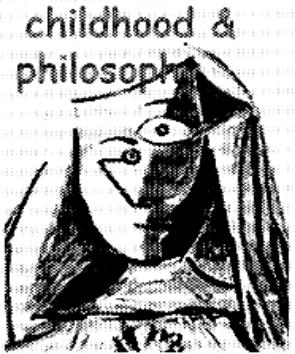o jardim da infância do pensamento
para onde vão as perguntas quando filosofamos com crianças da educação infantil?
DOI:
https://doi.org/10.12957/childphilo.2025.91737Keywords:
philosophy with children, infancy of thought, invention, language of thought, early childhood educationAbstract
This article is an excerpt from a master's research project that sought to explore the potential of thought experiences with young children aged 5 and 6. Based on 10 sessions of philosophical circles, the text traces the movement of thoughts expressed through gestures, images, silences, and fictions, resisting the school-centered logic of the "correct answer." In their words and listening, children invent their own ways of existing and learning, revealing that thinking is also an ethical, aesthetic, and political gesture. Inspired by authors like Kohan, Foucault, Larrosa, Skliar, Malaguzzi, and Vicenzi, the article proposes the "kindergarten of thought" as a territory of small things – a space where the invisible, the common, and the unpredictable become philosophical material. The work is developed through participatory research, based on narrative investigations, in which the researcher is also the teacher of the group. The fictional character Ágape – created within the context of this research – acts as a symbolic interlocutor, provoking the children's imagination and listening, and helping to sustain an atmosphere where doubt and creation find their place. The discussions show that, when invited to philosophize, young children not only say what they think but invent their own modes of language and understanding, often non-verbal, that overflow the expected and the didactic. In this sense, the kindergarten of thought is not a place of preparation for the future, but a territory of presence, where thinking opens to the world with lightness, intensity, and wonder.
Downloads
References
BARROS, Manoel. Memórias inventadas. Rio de Janeiro: Alfaguara, 2018a.
BARROS, Manoel. O livro das ignorãças. São Paulo: Alfaguara, 2018b.
BASTOS, Maria Helena Camara. A educação do homem: Fröbel. Educação e Filosofia, Uberlândia, v. 15, n. 29, p. 87-108, 2001. Disponível em: https://seer.ufu.br/index.php/EducacaoFilosofia/article/view/822. Acesso em: 4 maio 2025.
BRASIL. Base Nacional Comum Curricular. Brasília, DF: MEC, 2017.
COSTA CARVALHO, M. & SANTOS, A. I. (2022). Estes materiais tornam a filosofia verdadeira porque me ajudam a pensar: voos filosóficos de um conceito no Jardim de Infância. In M. C. Carvalho & P. A. Vieira (Orgs.), Arriscar-se na filosofia, acolhendo infâncias: encontros com Gabriela Castro (pp. 233-252). Ponta Delgada: Letras Lavadas.
FOUCAULT, Michel. Estratégia, poder-saber. In: FOUCAULT, M. Ditos e escritos IV. Rio de Janeiro: Forense Universitária, 2006.
FRÖBEL, Frisdrich. A educação do homem. Tradução Maria Helena Camara Bastos. Passo Fundo: Universidade de Passo Fundo, 2001. Obra original publicada em 1826.
KOHAN, Walter Omar. ¿Paulo Freire infantil? Notas para una pedagogía infantil de la pregunta. Revista del IICE, Buenos Aires, v. 49, p. 11-24, 2021. Disponível em: https://acervo.paulofreire.org/handle/7891/90232. Acesso em: 4 maio 2025.
KUHLMANN JR, Moysés. Pedagogia e rotinas no “jardim da infância”. In: KUHLMANN JR, M. Infância e Educação Infantil: uma abordagem histórica. Porto Alegre: Mediação, 1998.
LARROSA, Jorge. Experiência e alteridade em educação. Revista Reflexão e Ação, Santa Cruz do Sul, v. 19, n. 2, p. 4-27, 2011. Disponível em: https://doi.org/10.17058/rea.v19i2.2444. Acesso em: 21 jun. 2023.
MALAGUZZI, Loris. (1999). Histórias, ideias e filosofia básica. Entrevista concedida a L. Gandini. In: EDWARDS, C.; GANDINI, L.; FORMAN, G. (org.). As cem linguagens da criança. Porto Alegre: Artes Médicas Sul, 1999. p. 59-104.
SKLIAR, Carlos. A educação e a pergunta pelos outros: diferença, alteridade, diversidade e o outro “outros”. Ponto de Vista, Florianópolis, v. 5, p. 37-49, 2003.
VICENZI, Vinicius Bertoncini. Fala, gesto, silêncio: uma questão pedagógica. A discussão entre sofistas e filósofos pelo sentido e poder de ensinar. Rio de Janeiro: Nefi, 2017.



